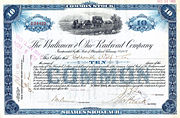
Stock certificate
Encyclopedia

Ownership
Ownership is the state or fact of exclusive rights and control over property, which may be an object, land/real estate or intellectual property. Ownership involves multiple rights, collectively referred to as title, which may be separated and held by different parties. The concept of ownership has...
of a specific number of stock share
Stock
The capital stock of a business entity represents the original capital paid into or invested in the business by its founders. It serves as a security for the creditors of a business since it cannot be withdrawn to the detriment of the creditors...
s (or fractions thereof) in a corporation
Corporation
A corporation is created under the laws of a state as a separate legal entity that has privileges and liabilities that are distinct from those of its members. There are many different forms of corporations, most of which are used to conduct business. Early corporations were established by charter...
. In large corporations, buying shares does not always lead to a stock certificate (in a case of a small number of shares purchased by a private individual
Natural person
Variously, in jurisprudence, a natural person is a human being, as opposed to an artificial, legal or juristic person, i.e., an organization that the law treats for some purposes as if it were a person distinct from its members or owner...
, for instance).
In the United States
United States
The United States of America is a federal constitutional republic comprising fifty states and a federal district...
, electronic registration is supplanting the stock certificate. Companies are no longer required to issue paper certificates, and over 420 of the 7,000-plus publicly traded securities do not. Brokers may charge up to $500 for issuing a paper certificate, though this fee can be avoided by registering shares directly with the stock transfer agent (as opposed to "street name
Street name securities
In the United States street name securities are securities of publicly traded companies held electronically in the account of a stock broker, similar to a bank account. The actual shareholder is referred to as the beneficial owner. In the United Kingdom this is known as holding shares in a...
") and having them issue the certificate.
In Sweden
Sweden
Sweden , officially the Kingdom of Sweden , is a Nordic country on the Scandinavian Peninsula in Northern Europe. Sweden borders with Norway and Finland and is connected to Denmark by a bridge-tunnel across the Öresund....
, share certificates have been largely abolished, people using electronic shares instead (which are either registered in the share owner's name or in the share owner's broker's name). Share certificates may exist in Sweden, but only if the shares are not listed on any stock exchange in Sweden, and the availability of share certificates has nothing to do with voting in shareholders' general meetings. Sometimes a shareholder with a stock certificate can give a proxy
Proxy voting
Proxy voting has two forms: delegable voting and delegated voting, which are procedures for the delegation to another member of a voting body of that member's power to vote in his absence, and/or for the selection of additional representatives, as in the case with transitive proxies...
to another person to allow them to vote the shares in question. Similarly, a shareholder without a share certificate may often give a proxy to another person to allow them to vote the shares in question. Voting rights are defined by the corporation's charter and corporate law
Corporate law
Corporate law is the study of how shareholders, directors, employees, creditors, and other stakeholders such as consumers, the community and the environment interact with one another. Corporate law is a part of a broader companies law...
.
Stock certificates are generally divided into two forms: registered stock certificates and bearer stock certificates. A registered stock certificate is normally only evidence of title, and a record of the true holders of the shares will appear in the stockholder's register of the corporation. A bearer stock certificate, as its name implies is a bearer instrument
Bearer instrument
A bearer instrument is a document that indicates that the owner of the document has title to property, such as shares or bonds. Bearer instruments differ from normal registered instruments, in that no records are kept of who owns the underlying property, or of the transactions involving transfer of...
, and physical possession of the certificate entitles the holder to exercise all legal rights associated with the stock. Bearer stock certificates are becoming uncommon: they were popular in offshore jurisdictions
Offshore financial centre
An offshore financial centre , though not precisely defined, is usually a small, low-tax jurisdiction specializing in providing corporate and commercial services to non-resident offshore companies, and for the investment of offshore funds....
for their perceived confidentiality, and as a useful way to transfer beneficial title to assets (held by the corporation) without payment of stamp duty
Stamp duty
Stamp duty is a tax that is levied on documents. Historically, this included the majority of legal documents such as cheques, receipts, military commissions, marriage licences and land transactions. A physical stamp had to be attached to or impressed upon the document to denote that stamp duty...
. International initiatives have curbed the use of bearer stock certificates in offshore jurisdictions, and tend to be available only in onshore financial centres, although they are rarely seen in practice.

